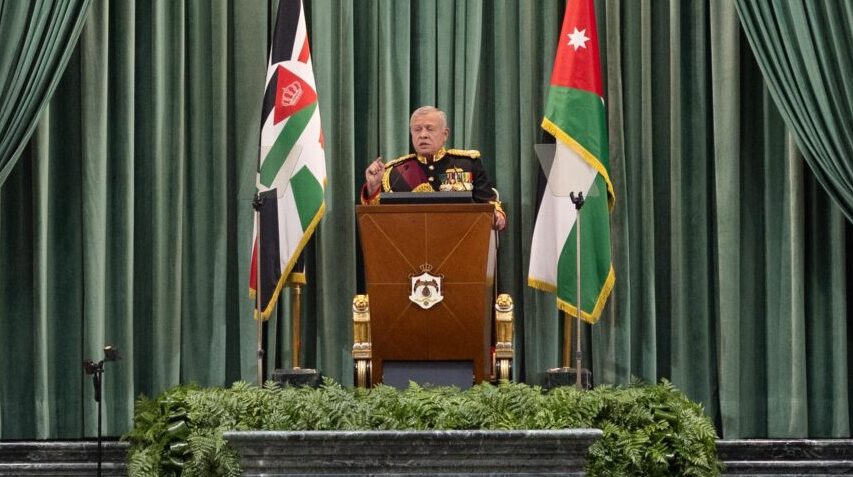Are Jordanian Demands of Open Borders Serious?
Protestors in Jordan want open borders with Israel so they can join Hamas in its campaign against the "Zionist enemy." King Abdullah has no intention of doing so, but his security forces are in a precarious position.
A recurring slogan has become a focus of most anti-Israeli and pro-Palestinian demonstrations taking place in Jordan. The protestors are calling on their government to open the borders with Israel and allow those who want to fight the “Zionist enemy” to be able to do so. Despite these repeated chants, this is unlikely to happen now or anytime soon.
Such calls follow an appeal by Hamas leaders to neighboring countries and people to support their military campaign dubbed the “Al Aqsa Tsunami.”
What needs to be understood is that the conflict is not limited to Palestinians. People around the world and especially here in Jordan are passionate about the need for a resolution to the Palestinian-Israeli conflict.
Military analyst Mamoun Abu Nuwar, a retired Jordanian Air Force major general, told The Media Line that these calls should be taken seriously because they reflect a deeply held belief that the issue of Jerusalem and Palestine extends beyond borders. “What needs to be understood is that the conflict is not limited to Palestinians. People around the world and especially here in Jordan are passionate about the need for a resolution to the Palestinian-Israeli conflict,” he said.
These political and military issues were highlighted by Jordan’s King Abdullah II during the opening session of the Jordanian Parliament on Wednesday. In his address, the king said, “There can be no security, no peace, and no stability without a just and comprehensive peace, to which the only way can be through the two-state solution.”
Our compass will always point to Palestine, with Jerusalem in its heart, and we will never falter in defending its interests and just cause
Give the gift of hope
We practice what we preach:
accurate, fearless journalism. But we can't do it alone.
- On the ground in Gaza, Syria, Israel, Egypt, Pakistan, and more
- Our program trained more than 100 journalists
- Calling out fake news and reporting real facts
- On the ground in Gaza, Syria, Israel, Egypt, Pakistan, and more
- Our program trained more than 100 journalists
- Calling out fake news and reporting real facts
DONATEJoin us.
Support The Media Line. Save democracy.
He clearly noted that “our compass will always point to Palestine, with Jerusalem in its heart, and we will never falter in defending its interests and just cause.”
After each of these statements, members of both houses of parliament as well as the audience gave King Abdullah a standing ovation. He also praised the Jordanian Armed Forces and their protective role in safeguarding the nation’s security.
“Our homeland will remain steadfast, protected by the starving members of the Jordanian Armed Forces—the Arab Army and the security services, who made sacrifices, generation after generation, and protected the homeland with joy and souls, in order to raise its flag, and preserve its strength so that it remains dear and feared,” said King Abdullah. “They have all our appreciation and greetings, and we will not refrain from providing all support to develop their capabilities and maximize their strength,” he concluded.
This statement inspired more clapping and a standing ovation by those members of the military who were present. Notably, instead of basking in the audience’s positive reaction and support, King Abdullah himself began clapping as he looked up to the members of the Jordanian Armed Forces in attendance.
This support for Jordan’s security forces was not coincidental. Hamas’ calls for support from tribal communities and fellow Islamic movements have put King Abdullah and his security forces in an unenviable position. They are now forced to do Israel’s work: preventing anyone in Jordan from approaching what is considered to be the longest border with Palestinian areas that are controlled by the Israeli army and with Israel proper.
Tribal leaders interviewed by Radio Al-Balad were divided regarding their reactions to Hamas’ rallying call. Meanwhile, Jordan’s Islamic Movement leaders made it publicly clear that they are cognizant of the difficult position that Jordan’s leadership is in and will not challenge it by trying to hold a protest close to the border with Israel.
There is real fear that if the war theater is spread to the West Bank, then the issue of mass transfer becomes a major concern to the Jordanian leadership, and this will not be tolerated under any circumstance
Dr. Omar Radad, a Jordanian security strategist, told The Media Line that he doesn’t expect any activity other than political calls in response to calls to open the border. “This is not the first time that Khaled Meshaal has called on tribes to join the resistance, but it has been rebuffed before, and Jordan is united in support of Palestine but within political means.”
Radad noted, though, that the concern and fear of many is that the Gaza confrontations could move to the West Bank. “However, there is real fear that if the war theater is spread to the West Bank, then the issue of mass transfer becomes a major concern to the Jordanian leadership, and this will not be tolerated under any circumstance,” he said.
Radad said that he expects that the aftermath of the October 7 events and the declaration of war by Israel will eventually require a political solution and that the “king and the Jordanian leadership, with the support of the people of Jordan, will be able to make a strong case for the need to implement a peaceful resolution and to end the occupation.”



